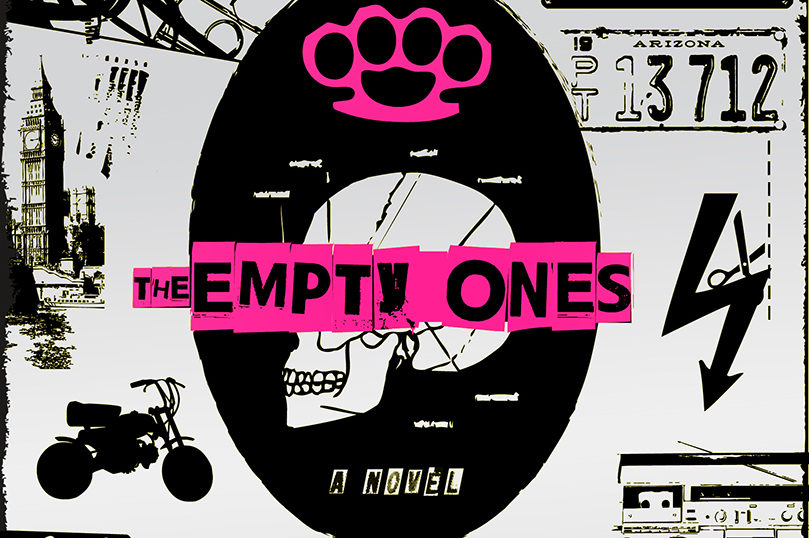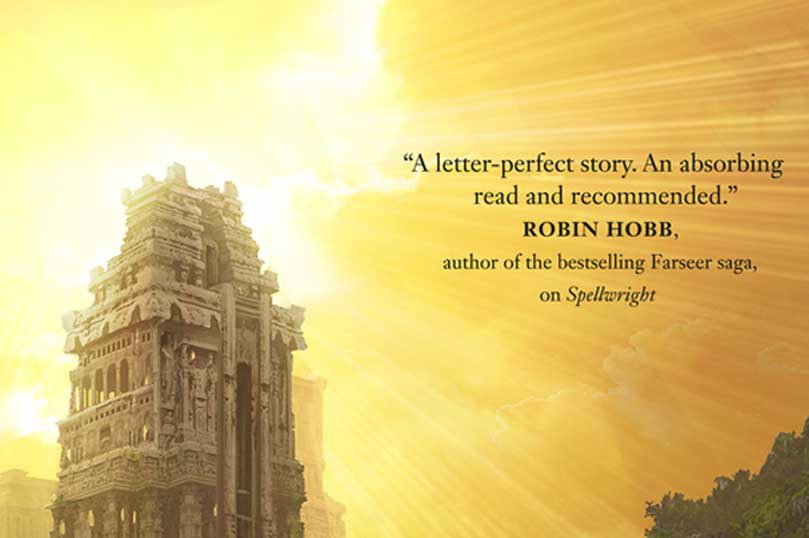





 Leandra Weal has a bad habit of getting herself in dangerous situations.
Leandra Weal has a bad habit of getting herself in dangerous situations.
While hunting neodemons in her role as Warden of Ixos, Leandra obtains a prophetic spell that provides a glimpse one day into her future. She discovers that she is doomed to murder someone she loves, soon, but not who. That’s a pretty big problem for a woman who has a shark god for a lover, a hostile empress for an aunt, a rogue misspelling wizard for a father, and a mother who–especially when arguing with her daughter–can be a real dragon.
Leandra’s quest to unravel the mystery of the murder-she-will-commit becomes more urgent when her chronic disease flares up and the Ixonian Archipelago is plagued by natural disasters, demon worshiping cults, and fierce political infighting. Everywhere she turns, Leandra finds herself amid intrigue and conflict. It seems her bad habit for getting into dangerous situations is turning into a full blown addiction.
As chaos spreads across Ixos, Leandra and her troubled family must race to uncover the shocking truth about a prophesied demonic invasion, human language, and their own identities–if they don’t kill each other first.
Spellbreaker, the long awaited sequel to Blake Charlton’s Spellbound, will be available August 23rd. Please enjoy this excerpt.
CHAPTER
One
To test a spell that predicts the future, try to murder the man selling it; if you can, it can’t. That, at least, was Leandra’s rationale for poisoning the smuggler’s blackrice liqueur.
On a secluded beach, they knelt and faced each other across a seaworn bamboo table. Above, a clear night sky crowded with stars and two half-moons. To Leandra’s left, a grove of slender palms, crosshatched moonshadows, short green grass. To her right, an expanse of dark seawater and lush limestone formations known as the Bay of Standing Islands.
Leandra’s catamaran rocked between two such limestone formations that rose narrow from the bay but widened into craggy rock, vines, and ferny cycads. “Mountains on stilts,” her illustrious father had once called the standing islands.
Across the table, the smuggler cleared his throat. Leandra, using several intermediaries, had agreed to meet him on this beach east of Chandralu. Both parties had asked that names not be used; however, as was the way of such meetings, neither party had asked that homicidal duplicity not be used. So Leandra picked up the smuggler’s porcelain bottle of blackrice liqueur. Calmly she poured the ambercolored spirit into his wooden cup.
He was watching her every action, but it was too late. She had already drawn a needle from her sleeve and held it against the bottle’s neck so the liqueur poured over its poisoned point. Then she filled her own cup, knowing the toxin had washed off.
The smuggler was a handsome man of middle years—flawless black skin, black goatee chased with silver, wide nose, large eyes. He wore a blue lungi and loose white blouse as if he were of the Lotus People, but his posture was laxer, his speech quicker than was polite in Lotus culture.
Also notable, the smuggler had wrapped a cloth around his head to conceal the spell he was selling. In places, a crimson glow shone through the headwrap. Because Leandra perceived some divine languages as red light, the glow suggested that the man was what he claimed to be—which is to say the kind of man that filled Leandra with hatred so molten hot that it would transform any sensible woman into an eye-gouging, throat-biting whirl of violence. Fortunately, Leandra was not a sensible woman.
She lifted her cup with one hand and flicked the needle away with the other. The smuggler did not hear it strike sand. “To your future,” she said.
“To your future,” he echoed. Blank expression.
With one draft, Leandra downed her blackrice liqueur. It was a fragrant, gratuitously alcoholic substance. The Lotus People called it mandana and drank it when conducting religious ceremonies or business transactions. Having lived in the Ixonian Archipelago for thirteen years, Leandra had drunk gallons of the stuff without becoming accustomed to it. She wondered if anyone ever did.
The mandana traveled down her throat as liquid and up her sinuses as harsh, flavored vapor. Every inch from her stomach to nosetip burned as if scrubbed with astringent. Taste came last and started sweet like chewed sugarcane but then curdled into something that approximated honeyed monkey vomit.
Throughout the miniature alcoholic ordeal, Leandra kept her expression pleasant. Fortunate that she did; the smuggler was studying her. She wasn’t much to see, short and frail, wearing a long-sleeved dress of pale yellow. A black silk headdress tied below her chin hid her dark hair and pale neck.
Leandra was unaccustomed to the gaze of strangers; in daylight, she wore a veil that concealed all but her eyes. Her disease required that she avoid sunlight.
A lover had once remarked that, in certain circumstances, her wide brown eyes seemed misleadingly innocent and vulnerable. Given the smuggler’s scrutiny, Leandra hoped that these “certain circumstances” included those in which she was plotting murder.
The smuggler raised his cup to drink, but then his face tensed. He paused and looked past Leandra. Maybe ten feet away stood four-armed Dhrun—Leandra’s divine protector, brawler, erstwhile confidant.
“Oh, don’t mind my bodyguard,” she said while turning to regard Dhrun, who presently was manifesting his youngest incarnation. “He couldn’t harm a soul unless he’s got something sharp to jam through … oh … well … he does seem to have two rather long swords, doesn’t he?”
The smuggler stared at her flatly.
What Leandra had said wasn’t strictly true; Dhrun was deadliest barehanded, but she had liked the way the quip sounded. So she broadened her smile and asked the smuggler, “Not one for levity?”
“Not at the moment.”
“Pity. But truly, don’t mind my bodyguard. Your men hiding in the grove could reach us before he could.” She looked at the silhouettes scattered among the palms. An untrained eye would mistake them for stumps or rocks, but Leandra could see at least six figures. The closest crouched not six feet away and carried all the implements necessary to poke distressingly large holes in a body. She gave the camouflaged assassin a slight nod.
Leandra made sure that she had no bad habits, only full-blown addictions—flirting with danger being one of her favorites.
The smuggler was still studying Dhrun. “He isn’t human, is he?”
“What was your first clue, his third or fourth arm?”
The smuggler scowled. “It’s hard to know what to expect in the league, especially on Ixos. Your islands are a menagerie of demigods or divinity complexes or whatever you call them. So, this … bodyguard … is a god?”
“No, he is the complex of three souls: a god of wrestling named Dhrun; his avatar, a young human wrestler who took the name of Dhrunarman after winning last year’s championship; and an ancient Cloud Culture goddess of victory named Nika. So a man, a god, and a goddess, not unusual for a divinity complex, some parts of him are divine, some parts are human; he just has to decide which parts.”
“What are his choices?”
“Male, female, some of the ports of call lying between the two, if you catch my drift.”
“I do not catch it.”
“No, I suppose you wouldn’t.”
The smuggler looked at her catamaran. Its twin hulls and the decks that stretched between them shone in the moonlight.
Leandra’s patience thinned. “As agreed, my crew remained aboard. You needn’t worry about an attack.”
“Something is wrong.”
“What do you mean?”
He looked out at the Bay of Standing Islands. “No ship followed you here?”
“None.”
“You’re certain?”
“My captain and crew are Sea People; they know how to navigate the standing islands unseen.”
“But you’ve heard the rumors?”
“Rumors of what? That the Disjunction has come at last? That after thirty damn years of waiting around, Los and the demons of the Ancient Continent finally found their backsides with both hands and crossed the ocean?”
Thirty four years ago, Nicodemus Weal and his wife, Francesca DeVega, had defeated the demon Typhon; however, a dragon known as the Savanna Walker had escaped to the Ancient Continent, which should have allowed the demons to cross the ocean to destroy all human language in the War of Disjunction. But the demons had not come. No one knew why. Now after three decades of anticipation, some doubted that the demons would ever come.
The smuggler snorted. “No, no, nothing about the Disjunction. These are rumors of another human war. Reports of crop failures have come from Verdant. Seems the Silent Blight is worsening in the empire, and perhaps Empress Vivian is eying Ixos’s rice and taro fields. The shipyards of Abuja are frantic with construction. A new fleet of hierophantic airships flies above Trillinion.”
Leandra kept her face impassive.
He continued. “The league is reinforcing Lorn’s northern border and sending ships to Ixos. Seems the peace between the empire and the league might spring another of its little leaks. The next year could see the Blockade of Ogun all over again. Or perhaps a second round of the Goldensward War. But you might know more about that?”
Leandra only stared.
The smuggler’s full lips peeled back into a smile. White teeth, moonlight. “You’re not one to hand out information. Good, good. Then consider how another human war might make our trade … particularly lucrative.”
“You have a proposal?”
“In Abuja there’s talk of a new power in Chandralu. The Cult of the Undivided Society, it’s called. They don’t worship neodemons like the usual cults; they worship the ancient demons. The empire and the league claim to have hunted down all of the demon worshipers after Typhon’s defeat, but maybe they missed a few. The Undivided Society is tired of waiting for the Disjunction and aims to hurry it along a step or two. Have you heard of it?”
“Tall tales from sailors drunk on kava, nothing more. The tellers often follow it with an account of the Floating Island.”
“Floating island?”
“Stories of an island of ghosts or neodemons that isn’t fixed to the sea floor but floats around the archipelago. Those who make landfall are doomed to damnation or reincarnation as pubic lice or whatever. My point is that sailors are better known for creativity than reliability.”
“And you think this Cult of The Undivided Society is just another sea yarn, just another floating island?”
“There’s no proof the cult exists.”
“But the Empress Vivian is offering a heavy purse for such proof. And she is sure to offer more now that her half-brother is in Ixos.”
Leandra stiffened. Twenty days ago Nicodemus Weal, the empress’s half-brother, had arrived in Chandralu ostensibly to cast his metaspells, which allowed deities to thrive in the league kingdoms. But in truth, he had come to reinforce the archipelago against possible imperial attack. More distressing, upon arrival, Nicodemus had heard rumors of the Undivided Society and of two neodemons attacking caravans near Chandralu. Therefore, Nicodemus had launched efforts not only to support his daughter, the Lady Warden of Ixos, but also to investigate her competency.
Leandra found this distressing for two reasons. First, she feared the smuggler would flee if he learned that Nicodemus had doubled the ships patrolling the bay. Second, she was, after all, Nicodemus’s daughter.
Family isn’t a word; it’s a sentence.
For three decades Leandra’s family had served as the wardens of the league, tasked with converting or destroying neodemons. As the Warden of Ixos, she was responsible for suppressing neodemons in the archipelago. If Nicodemus thought that the two marauding neodemons and the rumors of the Undivided Society signified her incompetence, he might revoke her independence.
Fifteen days ago, Nicodemus and his followers had set out to hunt one of two neodemons. He might return any day. Although Leandra did not dislike her father, there was much she hoped to accomplish before he returned, including closing a deal with this disturbingly well-informed smuggler. She looked at the man. “Should I learn anything about the Undivided Society, you will be the first to know. But I am not inclined to enter into a new agreement until the present one is concluded to my satisfaction.”
“Ah, yes, your prophetic spell,” the smuggler said and raised his cup to his lips. But then he paused and looked out to the bay. “Your pardon, but … I think I might … I sense … some danger…”
Leandra turned and saw nothing but moonlit waves and towering limestone islands. “Look, there is no ship among the islands. No army hiding under the table. No Nicodemus bloody Weal about to fall out of a God-of-god’s damned coconut tree. I am here to purchase that prophetic spell, but that text seems to be giving you distressingly little information about the future. What is this danger? Shouldn’t your spell foresee what it will be?”
“This spell doesn’t work that way. It allows me to feel forward into time.”
She frowned. “That sounds … rather ungentlemanly.”
“I can sense the emotions of all the different men I might become in an hour.”
“And how many of these men are there?”
“A near infinite number. I’m not aware of them all, but when many of them experience anxiety, I grow wary.”
Leandra studied the smuggler’s face. “What could be frightening them?”
“You saw no ships amid the standing islands?”
“No dammed ships. And no other threats.”
“Very well…” He looked down at his mandana. “Perhaps it’s just apprehension.” He raised the cup to his lips.
Leandra put her head to one side. Even with a prophetic spell around his head, he was going to drink poison? Feeling forward in time, as wondrous as it sounded, seemed as useful as a boiling pot made of Lornish butter.
But then the smuggler froze. He peered into his liqueur and frowned. He lowered the cup, paused, raised it back toward his lips, lowered it again. He looked at her, eyes narrowed, put the cup down.
Leandra allowed herself a small laugh. “Is there a problem?”
“The closer I bring the mandana to my lips, the more of my future selves are writhing in terror. What in the Creator’s name did you put in here?”
She shrugged. “The extract of a puffer fish liver, just a few drops. The hydromancers call it tetrodotoxin; it’s an old recipe of the Sea People. Just a bit of local flavor.”
“And what flavor would that be?”
“The flavor of nothing,” she said airily. “But half an hour from now your mouth would tingle. Then your face and hands would go numb. All your muscles would slacken and you’d stop breathing. As a windfall, you would be perfectly aware as paralysis caused you to suffocate to death.”
“Antidote?”
“None.”
“You have a very trusting soul.”
“I do,” she admitted. “One day it’ll be the death of someone else. Likely several someone elses. But don’t be too upset; I now have evidence that your prophetic spell is genuine.”
“You could have tried the text.” He picked up a slim leather folio from the ground beside him.
She shook her head. “What’s to stop you from selling me a death sentence? I will purchase the text around your head or nothing at all.”
“Killing you would not be good business. There is more I would like to sell you and information I hope you will sell to me. On next trip I could have more substantial texts.”
“Then let me increase your profit. I’ll double your price if you tell me where you get these spells.”
The man studied her but said nothing.
She pointed to his head. “A text that powerful couldn’t be written; it had to be part of a deity. I’m guessing you chopped one of the empire’s gods into sellable pieces.”
“You forget that imperial spellwrights have revolutionized composition. With Vivian’s metaspells, they are changing the rules.” He nodded toward the folio. “Inscribing brief godspells onto paper for example.” Previously, godspells could be imbued only into a deity’s ark stone.
Leandra shook her head. “Perhaps you had an imperial spellwright to set that godspell on paper, but no human mind could have composed it. Tell me where and how you are deconstructing deities. In return, I will investigate your Undivided Society. That or I could pay a large sum of jade.”
He studied her. “I wonder why you should want such information … and how much it is worth to you. Some information isn’t for sale to just anyone.”
“Then perhaps when our partnership is stronger?”
“Shall we meet again? Perhaps tomorrow … in the city?”
Leandra considered. “If this exchange proves satisfactory … tomorrow at dusk, my bodyguard will meet you by the Lesser Sacred Pool. You know where that is?”
He nodded.
“Come alone. If there is anyone else with you, you’ll never find us again. Understood?”
“Indeed. In the meantime, maybe you could tell me more about yourself?” he asked before seeing her blank expression and quickly adding, “Perhaps not your name or station, but—”
“If you discover my identity, then I will have to dispose of you in several large and bloody pieces deposited almost directly into a shark’s belly. I say ‘almost directly’ because the shark’s teeth would have to act as brief but effective intermediaries. And neither of us would want that.”
“Neither of us would.”
“Good, now for that godspell.” She gestured to her guard.
A moment later Dhrun placed two small chests next to the smuggler and opened them. One was filled with rough-cut jade and balls of opium. In the other chest lay plates of Lornish steel and lacquered Dralish wood, each imbued with black market magical language.
The smuggler sorted through the jade and then held his hands over the steel and wood, seemingly able to sense magical text. Only a spellwright using a synesthetic reaction could do so. That made him a rogue wizard perhaps? Or maybe a pyromancer? “It is good,” the smuggler said before holding out his folio.
“The godspell around your head,” Leandra said coldly.
“They’re identical, down to the last rune.”
She shook her head.
“How could I sell you this spell? I can’t remove this spell from my head.”
“My bodyguard will assist.”
The smuggler eyed Dhrun’s face, which presently was that of youthful Dhrunarman—light brown skin, aquiline nose, densely curled black hair, sparse beard. Dressed in a black lungi and a vest of scale armor, which showed to good advantage all four of his powerfully built arms, Dhrun looked every bit a young Ixonian divinity complex.
The smuggler looked back at Leandra. “Very well, but before I remove my headwrap, I will admit to being in disguise. I am not of the Lotus People.”
“You fill me with shock,” she said in deadpan before leaning forward. “What do most of your future selves feel an hour from now?”
“Some are satisfied … but some are agitated, a few very much so.”
“You still must smuggle your payments back into the city or out of the bay.”
He seemed to consider this and then removed his headwrap. His forehead was encircled by rubicund prose. Though Leandra was not fluent in the red language, her inheritance from her mother allowed her to visualize the divine text.
Then she realized that the smuggler’s hair consisted of silvering dreadlocks. “You’re Trillinonish,” she said and was struck by a sensation of familiarity. Had she seen this man before? No, it wasn’t possible. And yet … she couldn’t shake the feeling.
Dhrun put his upper hands to the back of the smuggler’s head. The radiant godspell slackened from his brow and then fell away. Holding the sentences as if they were a necklace, Dhrun carried the crimson language to Leandra and stood behind her.
As Leandra removed her headdress, she was aware of Dhrun’s lower hands resting on her shoulder and his upper hands moving near her ears. She caught glimpses of the godspell’s red glow, but she felt nothing press against her forehead or scalp. “Is the godspell around—” she started to ask, but then she perceived … what was it?
It was like nothing earthly.
Currents of emotion moved all around her but not through her. She felt them only partially, as if she were watching a poignant shadow play or listening to a touching song. But these sympathetic feelings were sparked not for actors or lyrics, but from the multiplicity of her future selves. There were thousands of her possible selves. Hundreds of thousands? No one could say how many.
Most of herselves felt variations on her present anxieties, but a few were filled with strange emotions changing too fast to identify. Concentrating on one of these improbable futures was like trying to barehandcatch an oiled gecko. And yet … Leandra couldn’t resist mentally chasing these bright futures.
Dhrun had walked back to the smuggler and was using his upper hands to pull rubicund sentences from the smuggler’s folio and tie them around the man’s head.
Leandra closed her eyes and concentrated on the alluring futures. Again they flitted away, but not before one gave her a glimpse into an hour hence in which she felt unabashed triumph. Leandra’s excitement grew. Perhaps she could learn the smuggler’s identity? Discover how he was eviscerating deities?
With even more vigor, Leandra mentally chased after this triumphant future. Within moments she lost it within a sea of banal hours.
Something more was needed.
Leandra peered through slit eyelids. Dhrun was adjusting the godspell tied around the smuggler’s head. Neither man was attending to her.
Because of her parentage, Leandra could give herself over to her disease and gain temporary fluency in magical language she was touching. In this state, she could perfectly understand and misspell any magical text. For a price, she became the universal spellbreaker.
If she used this ability now, she could alter her new godspell; however, this would undoubtedly cause the divine aspects of her body, which she had inherited from her mother, to attack the human aspects she had inherited from her father. The result would be a disease flare, possibly with dire consequences. And yet if she could catch that triumphant future, the rewards might justify the risks.
A change ran through her futures; more and more of them were filled with shock. Some also felt triumph, others raw horror. A different future had become probable, and the more she thought about that future, the more probable it became.
Leandra brought a hand up to her forehead and let her disease consume her. Soon her joints would ache and a rash would unfurl across the bridge of her nose, her forehead, her cheeks. Perhaps this flare would be so bad that Leandra would need to urinate frequently and her hands and face would swell. The God-of-god’s willing, the flare would not be so bad as to cause her perception to expand. But now, in this painless moment, she forgot the risks as her mind joined with the godspell.
For an instant, she became the text’s progenitor—a minor but ancient Trillinonish goddess of artistry, beauty, dance. The impoverished priests of her temple had sold her ark stone to the smugglers for thirty lengths of gold. The smugglers had bound her in a textual cage and cracked open her skull to pull the living language out of her mind. Her shrieks deafened two men.
In the next instant, Leandra returned to her own skull. Her hands were shaking as she thought of what the smuggler’s people had done.
Neither the smuggler nor Dhrun had noticed any change in Leandra. No doubt this was because of a side effect of Leandra’s current condition. When her disease flared, Leandra caused those nearby to better understand any language with which she was working. Fortunately an increased awareness of the red language had made the two men more preoccupied with the text around the smuggler’s brow.
Leandra wanted to know more about how the godspell around her head had been created. The imperial spellwright who had edited it had shaped the text so that it would project a human mind forward by one hour, but in the flare of her disease Leandra was less human, more textual.
Carefully she misspelled one word in the godspell’s first sentence and so increased her perception twenty-four times farther into the future. No other mortal creature but she could have made this misspelling, not even her illustrious father.
Normally Leandra would have been proud of such an achievement, but now she felt nothing but overwhelmed by the newly perceptible future selves. If she had thought the next hour contained a multiplicity of futures, the next day produced a million times as many, a hundred million times as many.
She swayed, struggling to retain her sanity amid the prismatic spray of herselves. In the past her hybrid-mind had been prone to dangerous expansions of perception, but nothing so dangerous as this had ever happened before. Now only one thing saved her from madness. Only one thing allowed her to grab the table with both hands as if she were drunk.
A little less than a third of her future selves were wracked by a specific guilt. Though Leandra had never felt it before, she recognized the dreadful emotion as that belonging to someone who had recently killed a dear friend, a family member, or a lover.
Another third of her future selves were filled with the anxieties of someone fleeing danger and wracked with a devastating guilt about the sudden death of everyone she loved.
But the last third of her future selves felt nothing. Nothing at all. And they felt nothing, because they were all dead.
With her godspell-laced mind working so hotly in the future, Leandra deduced the implications of these emotions into her own, personal prophecy: In one day’s time, she had to choose between dying or murdering someone she loved. If she tried to run or avoid the prophecy, everyone she loved would perish.
Leandra misspelled her godspell again so that she could feel only an hour forward. The prism of herselves collapsed enough so that it no longer drove her toward insanity. Her breathing slowed. Her heart calmed. But now she needed to hurry back to Chandralu and solve the mystery of her future murder.
She shuddered as she remembered the emotions of the women she would become. She could not run or everyone she knew would suffer. No way around it. In one day’s time, she would have to murder someone she loved or die.
She looked up at Dhrun. He looked back at her with curious, beautifully dark eyes.
Leandra was left with one question.
Who?
Copyright © 2016 by Blake Charlton
Buy Spellbreaker here:






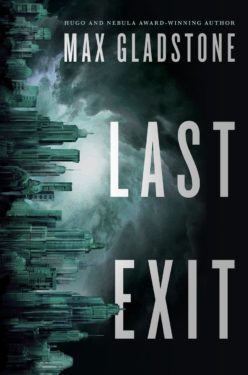 Max Gladstone’s Last Exit is the winding tale of a labyrinthian web of alternate realities, the poisonous rot that corrupts so many of them, and of a woman who once set off with her friends to find something better, or make it. But the writing of Last Exit held just as many twists as the resulting plot! Here, Max presents his story behind the story, and it’s an exciting one: Robbery, rumination, writing, and a shoutout to Bob Seger await. Check it out!
Max Gladstone’s Last Exit is the winding tale of a labyrinthian web of alternate realities, the poisonous rot that corrupts so many of them, and of a woman who once set off with her friends to find something better, or make it. But the writing of Last Exit held just as many twists as the resulting plot! Here, Max presents his story behind the story, and it’s an exciting one: Robbery, rumination, writing, and a shoutout to Bob Seger await. Check it out!
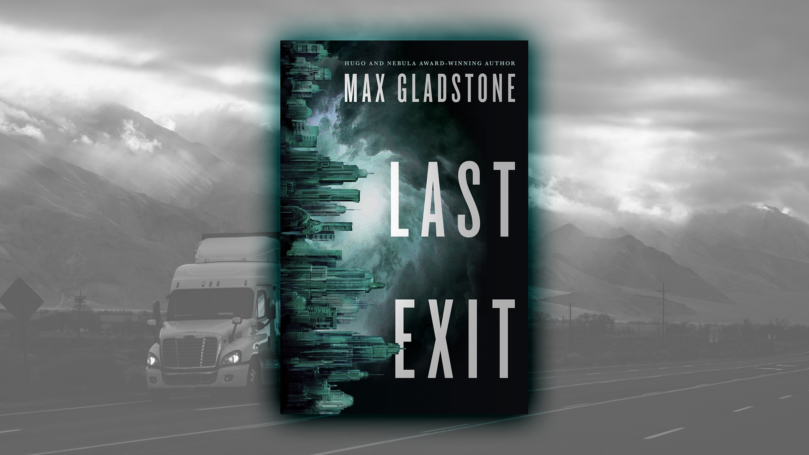






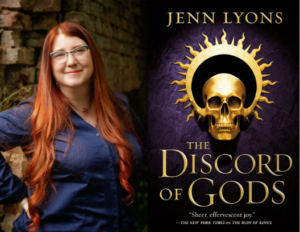
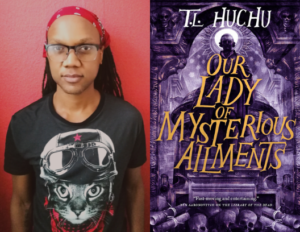

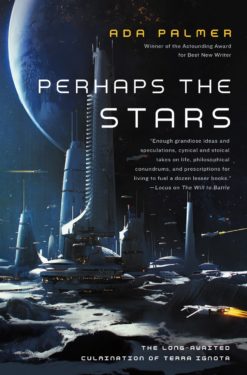

 The Dream-Hunter
The Dream-Hunter Upon the Midnight Clear
Upon the Midnight Clear Dream Chaser
Dream Chaser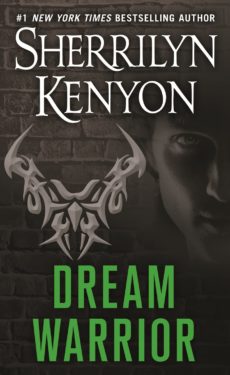 Dream Warrior
Dream Warrior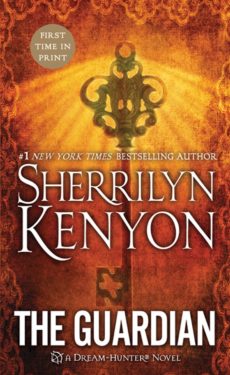 The Guardian
The Guardian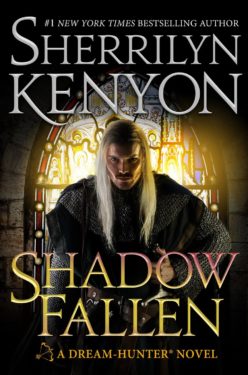 Shadow Fallen
Shadow Fallen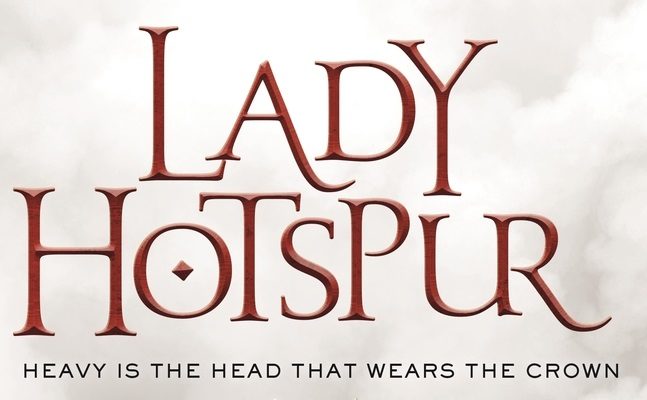

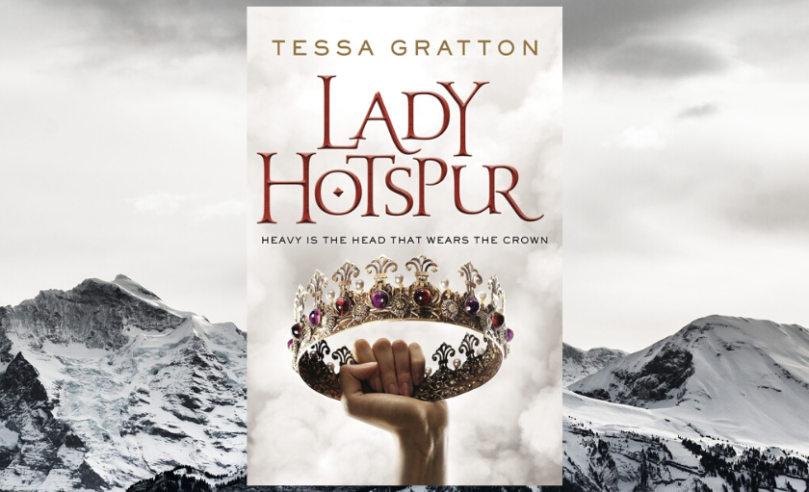
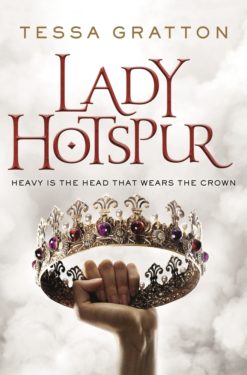 We are so incredibly, over-the-top, crazy-in-love with
We are so incredibly, over-the-top, crazy-in-love with 
 Henry IV’s heir who hangs out with drunks and thieves, but says it’s part of a plan to stun people with how kingly and capable he is later is turned into
Henry IV’s heir who hangs out with drunks and thieves, but says it’s part of a plan to stun people with how kingly and capable he is later is turned into  The famous knight, and leader of the English rebel forces against King Henry, with very poor impulse control is turned into Lady Hotspur, a famous knight with a hot temper, and part of Celeda’s rebellion. She is heir to the earldom of Perseria.
The famous knight, and leader of the English rebel forces against King Henry, with very poor impulse control is turned into Lady Hotspur, a famous knight with a hot temper, and part of Celeda’s rebellion. She is heir to the earldom of Perseria. The man who was heir to the deposed Richard II is turned into Banna Mora, a young woman who was
The man who was heir to the deposed Richard II is turned into Banna Mora, a young woman who was  Prince Hal’s surrogate father in the tavern world, a big-time drunk, cheat, thief, and scoundrel is turned into Lady Ianta Oldcastle, the
Prince Hal’s surrogate father in the tavern world, a big-time drunk, cheat, thief, and scoundrel is turned into Lady Ianta Oldcastle, the  The Earl of Worcester, Hotspur’s uncle and fellow rebel leader is turned into Duke Vindomata of Mercia, Lady Hotspur’s aunt and a part of Celeda’s rebellion. Vindomata is known as the King-Killer.
The Earl of Worcester, Hotspur’s uncle and fellow rebel leader is turned into Duke Vindomata of Mercia, Lady Hotspur’s aunt and a part of Celeda’s rebellion. Vindomata is known as the King-Killer. The leader of Welsh rebels, father of Lady Mortimer is turned into the
The leader of Welsh rebels, father of Lady Mortimer is turned into the  Owyn Glyndwr’s daughter is turned into Prince Rowan,
Owyn Glyndwr’s daughter is turned into Prince Rowan, 











